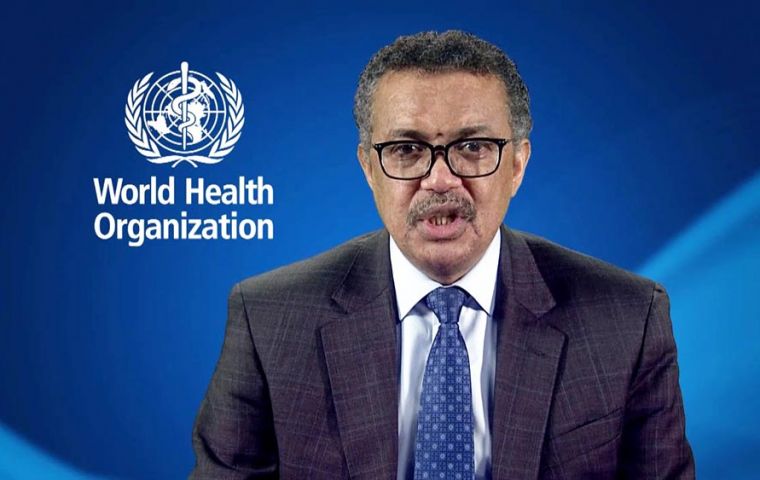MercoPress. South Atlantic News Agency
WHO focuses on “Test.Treat.Hepatitis” on World Hepatitis Day
 WHO Director-General Dr Tedros Adhanom Ghebreyesus said, ”we must accelerate progress to achieve our goal of eliminating hepatitis by 2030”
WHO Director-General Dr Tedros Adhanom Ghebreyesus said, ”we must accelerate progress to achieve our goal of eliminating hepatitis by 2030” The World Health Organization (WHO) and partners are calling on countries to urgently increase hepatitis testing and treatment services in order to eliminate viral hepatitis as a public health threat by 2030.
The calls come in the lead-up to World Hepatitis Day 2018 on 28 July, which focuses on the theme “Test.Treat.Hepatitis.”
WHO Director-General Dr Tedros Adhanom Ghebreyesus said in a video statement, “We have a clear vision for elimination, and we have the tools to do it. But we must accelerate progress to achieve our goal of eliminating hepatitis by 2030.”
Viral hepatitis B and C affect 325 million people around the world. Left untreated, these infections lead to liver cancer and cirrhosis, which together caused more than 1.3 million deaths in 2015 alone.
Worldwide, less than 20% of people had access to testing and treatment services for hepatitis B and C infections at the end of 2016.
To mark World Hepatitis Day 2018, WHO is holding several events with the Government of Mongolia, a country that is heavily burdened by hepatitis but also a champion in the global fight.
Over 10% of Mongolia’s 3 million people are living with chronic hepatitis infection. The country started its national Healthy Liver Program in 2017, with ambitious targets for 2020.
“Within the first year of the national program, which targeted the 40–65 year age group, we were able to reach more than 350 000 people with hepatitis testing,” said Ms Davaajantsan Sarangerel, Minister of Health, Mongolia.
“Over 70% of people diagnosed with hepatitis were provided with life-saving treatment.” The country aims to provide hepatitis B and C screening to 1.8 million people aged over 15 years.
Mongolia’s progress in the fight against hepatitis is led by political commitment and an ambitious universal health coverage agenda. The country is the first lower-middle-income country in Asia and the Pacific to commit to hepatitis elimination, by ensuring universal access and health insurance coverage for hepatitis testing and treatment for its entire population.
Aiming to speed up global progress, WHO is also releasing new global guidelines on hepatitis C treatment. The guidelines enable major simplifications in the delivery of curative therapy to the 70 million people living with chronic hepatitis C in the world.
“Eliminating hepatitis will require ongoing innovation, better medicines, and improved health services,” said Dr Gottfried Hirnschall, WHO Director for HIV and Hepatitis. “Our new recommendations should pave the way for everybody with hepatitis C to access testing and curative treatment now.”




Top Comments
Disclaimer & comment rulesCommenting for this story is now closed.
If you have a Facebook account, become a fan and comment on our Facebook Page!